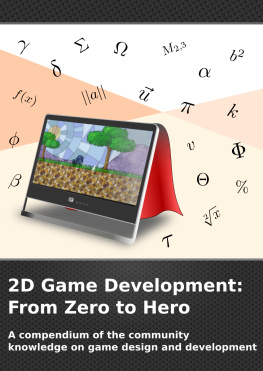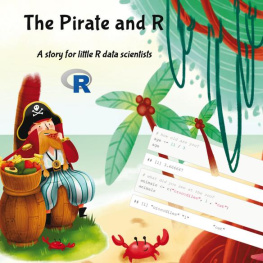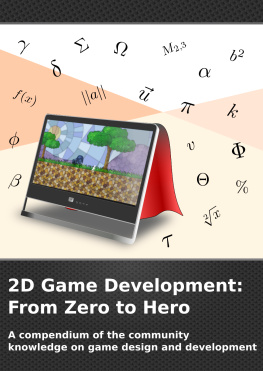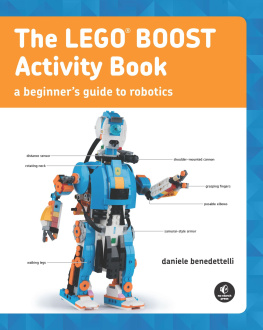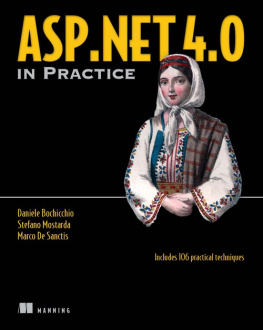Daniele Penazzo (Penaz) - 2D Game Development: From Zero To Hero
Here you can read online Daniele Penazzo (Penaz) - 2D Game Development: From Zero To Hero full text of the book (entire story) in english for free. Download pdf and epub, get meaning, cover and reviews about this ebook. year: 2022, publisher: Daniele Penazzo, genre: Home and family. Description of the work, (preface) as well as reviews are available. Best literature library LitArk.com created for fans of good reading and offers a wide selection of genres:
Romance novel
Science fiction
Adventure
Detective
Science
History
Home and family
Prose
Art
Politics
Computer
Non-fiction
Religion
Business
Children
Humor
Choose a favorite category and find really read worthwhile books. Enjoy immersion in the world of imagination, feel the emotions of the characters or learn something new for yourself, make an fascinating discovery.
- Book:2D Game Development: From Zero To Hero
- Author:
- Publisher:Daniele Penazzo
- Genre:
- Year:2022
- Rating:4 / 5
- Favourites:Add to favourites
- Your mark:
- 80
- 1
- 2
- 3
- 4
- 5
2D Game Development: From Zero To Hero: summary, description and annotation
We offer to read an annotation, description, summary or preface (depends on what the author of the book "2D Game Development: From Zero To Hero" wrote himself). If you haven't found the necessary information about the book — write in the comments, we will try to find it.
2D Game Development: From Zero To Hero — read online for free the complete book (whole text) full work
Below is the text of the book, divided by pages. System saving the place of the last page read, allows you to conveniently read the book "2D Game Development: From Zero To Hero" online for free, without having to search again every time where you left off. Put a bookmark, and you can go to the page where you finished reading at any time.
Font size:
Interval:
Bookmark:
Daniele Penazzo
Copyright 2019-2022 Daniele Penazzo
2D Game Development: From Zero To Hero ( C++ edition, version 0.7.2-r2-1-g55313b7 ) is distributed under the terms of the Creative Commons Attribution-NonCommercial-ShareAlike International 4.0 license.
If you want to view a copy of the license, visit http://creativecommons.org/licenses/by-nc-sa/4.0/ or check the LICENSE file in the book repository.
.st0{fill:#ABB1AA;} .st1{fill:#FFFFFF;} .st2{fill:#FFFFFF;stroke:#000000;stroke-width:14;stroke-miterlimit:10;}The PDF and EPub releases of this book can be found at the following address:
- https://therealpenaz91.itch.io/2dgd-f0th (Official Itch.io Page)
This books source code can be found in the following official repositories:
- https://gitlab.com/Penaz/2dgd_f0th (Official GitLab Repository)
- https://github.com/Penaz91/2DGD_F0TH/ (Official GitHub Repository)
This work shall be attributed to Daniele Penazzo and the 2D Game Development: From Zero To Hero community, to see a full list of the contributors, please check the CONTRIBUTORS file in the repository, or head to the contributors section in this book.
Anonymous
- To my family
- To my friends, both international and not
- To the ones who never give up
Daniele Penazzo
Every time we start a new learning experience, we may be showered by a sleuth of doubts and fears. The task, however small, may seem daunting. And considering how large the field of Game Development can be, these fears are easily understandable.
This book is meant to be a reference for game developers, oriented at 2D, as well as being a collection of best practices that you should follow when developing a game by yourself (or with some friends).
But you shouldnt let these best practices jail you into a way of thinking that is not yours, actually my first tip in this book is do not follow this book. Yet.
Do it wrong.
Learn why these best practices exist by experience, make code so convoluted that you cannot maintain it anymore, dont check for overflows in your numbers, allow yourself to do it wrong.
Your toolbox is there to aid you, your tools dont have feelings that can be hurt (although they will grumble at you many times) in the same way that you cannot hurt a hammer when missing the nail head. You cannot break a computer by getting things wrong (at least 99.9999% of the time). Breaking the rules will just help you understand them better.
Write your own code, keep it as simple as you can, and practice.
Dont let people around you tell you that you shouldnt do it that way, if you allow that to happen youre depriving yourself of a great opportunity to learn. Dont let others lion tamer syndrome get to you, avoid complex structures as much as possible; cutting and pasting code will get you nowhere.
But most of all, never give up and try to keep it fun.
There will be times where you feel like giving up, because something doesnt work exactly as you want it to, or because you feel youre not ready to put out some code. When you dont feel ready, just try making something simple, something that will teach you how to manipulate data structures and that gives you a result in just a couple days of work. Just having a rectangle moving on the screen, reacting to your key presses can be that small confidence boost that can get you farther and farther into this world.
And when all else fails, take a pen, some paper and your favorite Rubber Duck (make sure it is impact-proof) and think.
Coding is hard, but at the same time, it can give you lots of satisfaction.
I really hope that this book will give you tips, tricks and structures that one day will make you say Oh yeah, I can use that!. So that one day you are able to craft an experience that someone else will enjoy, while you enjoy the journey that brings to such experience.
A journey of a thousand miles begins with a single step
Welcome to the book! This book aims to be an organized collection of the communitys knowledge on game development techniques, algorithms and experience with the objective of being as comprehensive as possible.
Its really common in todays game development scene to approach game development through tools that abstract and guide our efforts, without exposing us to the nitty-gritty details of how things work on low-level and speeding up and easing our development process. This approach is great when things work well, but it can be seriously detrimental when we are facing against issues: we are tied to what the library/framework creators decided was the best (read applicable in the widest range of problems) approach to solving a problem.
Games normally run at 30fps, more modern games run at 60fps, some even more, leaving us with between 33ms to 16ms or less to process a frame, which includes:
- Process the user input;
- Update the player movement according to the input;
- Update the state of any AI that is used in the level;
- Move the NPCs according to their AI;
- Identify Collisions between all game objects;
- React to said Collisions;
- Update the Camera (if present);
- Update the HUD (if present);
- Draw the scene to the screen.
These are only some basic things that can be subject to change in a game, every single frame.
When things dont go well, the game lags, slows down or even locks up. In that case we will be forced to take the matter in our hands and get dirty handling things exactly as we want them (instead of trying to solve a generic problem).
When you are coding a game for any device that doesnt really have infinite memory, like a mobile phone, consoles or older computers, this technical low-level know-how becomes all the more important.
This book wants to open the box that contains everything related to 2D game development, plus some small tips and tricks to make your game more enjoyable. This way, if your game encounters some issues, you wont fear diving into low-level details and fix it yourself.
Or why not, make everything from scratch using some pure-multimedia interfaces (like SDL or SFML) instead of fully fledged game engines (like Unity).
This book aims to be a free (as in price) teaching and reference resource for anyone who wants to learn 2D game development, including the nitty-gritty details.
Enjoy!
When talking about logic theory, the variables will be represented with a single uppercase letter, written in math mode: 
The following symbol will be used to represent a logical AND: 
The following symbol will be used to represent a logical OR: 
The logical negation of a variable will be represented with a straight line on top of the variable, so the negation of the variable  will be
will be 
Font size:
Interval:
Bookmark:
Similar books «2D Game Development: From Zero To Hero»
Look at similar books to 2D Game Development: From Zero To Hero. We have selected literature similar in name and meaning in the hope of providing readers with more options to find new, interesting, not yet read works.
Discussion, reviews of the book 2D Game Development: From Zero To Hero and just readers' own opinions. Leave your comments, write what you think about the work, its meaning or the main characters. Specify what exactly you liked and what you didn't like, and why you think so.

